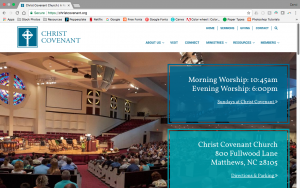Kevin DeYoung's Blog, page 21
September 25, 2017
Seven Characteristics of Liberal Theology
What is theological liberalism?
Liberalism is both a tradition—coming out of the late-18th century Protestant attempt to reconfigure traditional Christian teaching in the light of modern knowledge and values—and a diverse, but recognizable approach to theology.
Like any “ism,” liberalism is not easy to pigeonhole. But Gary Dorrien’s magisterial three volumes on The Making of American Liberal Theology present a coherent picture of a movement that has been marked by identifiable hermeneutical and sociological commitments. Even if one wishes to avoid liberal theology, it would still be wise to know something about a movement that has exerted such considerable influence over the past two hundred years.
Below are seven characteristics of liberalism that have been culled from the first volume of Dorrien’s trilogy. The headings are mine; the indented text is from the book.
1. True religion is not based on external authority
The idea of liberal theology is nearly three centuries old. In essence, it is the idea that Christian theology can be genuinely Christian without being based upon external authority. Since the eighteenth century, liberal Christian thinkers have argued that religion should be modern and progressive and that the meaning of Christianity should be interpreted from the standpoint of modern knowledge and experience. (xii)
What’s more, Dorrien recognizes this rejection is something new in the history of the church.
Before the modern period, all Christian theologies were constructed within a house of authority. All premodern Christian theologies made claims to authority-based orthodoxy. Even the mystical and mythopoetic theologies produced by premodern Christianity took for granted the view of scripture as an infallible revelation and the view of theology as an explication of propositional revelation. Adopting the scholastic methods of their Catholic adversaries, Protestant theologians formalized these assumptions with scholastic precision during the seventeenth century. Not coincidentally, the age of religious wars that preceded the Enlightenment is also remembered as the age of orthodoxy.
Reformed and Lutheran orthodoxy heightened the Reformation principle that scripture is the sole and infallibly sufficient rule of faith, teaching that scripture is also strictly inerrant in all that it asserts. (xv)
Note that Dorrien does not believe inerrancy was a Princetonian invention.
2. Christianity is a movement of social reconstruction.
One of the most influential definitions of theological liberalism was offered in 1949 by an able latter-day proponent, Daniel Day Williams: “By ‘liberal theology’ I mean the movement in modern Protestantism which during the nineteenth century tried to bring Christian thought into organic unity with the evolutionary world view, the movements from social reconstruction, and the expectations of ‘a better world’ which dominated the general mind. It is that form of Christian faith in which a prophetic-progressive philosophy of history culminates in the expectation of the coming of the Kingdom of God on earth.” (xiv)
3. Christianity must be credible and relevant.
Specifically, liberal theology is defined by its openness to the verdicts of modern intellectual inquiry, especially the nature and social sciences; its commitment to the authority of individual reason and experience; its conception of Christianity as an ethical way of life; its favoring of moral concepts of atonement; and its commitment to make Christianity credible and socially relevant to modern people. (xxiii)
4. Truth can be know only through changing symbols and forms.
Bushnell admonished that “all our difficulties and controversies” regarding the truths of revelation were caused by a basic failure to face up to what was known about the clothing of truths in signs and analogies. The problem was not peculiar to New England theology, he suggested; it was an “almost universal sin that infests the reasonings of mankind concerning moral and spiritual subjects.” Throughout the world, people treated the symbolic forms of their truths as the truths themselves. (151)
5. Theological controversy is about language, not about truth.
Bushnell debated various doctrinal points with his adversaries, claiming always that their disagreements were about language usage, not lack of belief: “All my supposed heresies, in reference to these great subjects, are caused by the arrest of speculation and the disallowance of those constructive judgments, or a priori arguments, by which terms that are only analogies, and mysteries that are most significant when taken only as symbols, are made to affirm something wiser and more exact than what they express.” (151-52)
6. The historical accuracies of biblical facts and events are not crucial, so long as we meet Jesus in the pages of Scripture.
He cautioned that the faithful reader of scripture is not obliged to assume the truth of the Gospel narrative “by which the manner and facts of the life of Jesus are reported to us.” That was the matter in question, “We only assume the representations themselves, as being just what they are, and discover their necessary truth, in the transcendent, wondrously self-evident, picture of divine excellence and beauty exhibited in them.” Bushnell counseled that the biblical narrative is not very impressive aside from the extraordinary character of its pivotal figure, but the more that we study the figure of Jesus, “a picture shining in its own clear sunlight upon us,” the more clearly we are brought into the source and light of all truth: “Jesus, the Divine Word, coming out from God, to be incarnate with us, and be the vehicle of God and salvation to the race.” (399)
7. The true religion is the way of Christ, not any particular doctrines about Christ.
The Word of Christ is not a doctrine or the end of an argument, but a self-authenticating life; it is morally regenerative spiritual power claimed in Christ’s spirit…Moving beyond their mentor, the Bushnellians accented the humanity of Christ; Munger and Gladden lifted Jesus’ teaching above any claims about his person. In both cases, however, a self-authenticating moral image conceived as the power of true religion was in control. The true religion is the way of Christ. (399-400)
Dorrien observes that this kind of religion was a departure from historic orthodoxy.
Traditional Protestant orthodoxies place the substitutionary atonement of Christ at the center of Christianity, conceiving Christ’s death as a propitiatory sacrifice that vicariously satisfied the retributive demands of divine justice. (400)
The new progressive religion of liberalism understood Christianity quite differently.
By the end of Beecher’s life, it was almost prosaic for Munger and Gladden to assert that Christianity is essentially a life, not a doctrine. (405)
Conclusion
Liberalism is not a swear word to be thrown around. It is a diverse, but identifiable approach to Christianity, one that differs significantly from historic orthodoxy, not to mention evangelicalism and fundamentalism. Liberals believe they are making Christianity relevant, credible, beneficial, and humane. Evangelicals in the line of J. Gresham Machen believe they are making something other than Christianity. That was the dividing line a century ago, and the division persists.
The post Seven Characteristics of Liberal Theology appeared first on The Gospel Coalition.
September 24, 2017
Monday Morning Humor
It’s time for Christ Covenant’s annual pastor’s retreat, which means we’ll be doing this sort of thing pretty much all week.
The post Monday Morning Humor appeared first on The Gospel Coalition.
Monday Morning Humor
It’s time for Christ Covenant’s annual pastor’s retreat, which means we’ll be doing this sort of thing pretty much all week.
September 21, 2017
The Cheap Way to Bless Your Pastor
 This is the sort of post I can write only because my church doesn’t need to read it. My church allows for ample vacation time and more study leave than most pastors would dare to ask for. I’m blessed and extremely thankful.
This is the sort of post I can write only because my church doesn’t need to read it. My church allows for ample vacation time and more study leave than most pastors would dare to ask for. I’m blessed and extremely thankful.
But many pastors are not so fortunate.
So let me make a simple plea. For any elders, deacons, trustees, and committee chairs—to anyone with authority over the fringe benefits for your pastor—please make sure there is enough time for a real vacation and some kind of study leave. It’s the cheapest way to bless your pastor and one of the best things you can do for your church.
When I started out as an associate pastor in Iowa at the ripe old age of 25 I was given (if memory serves) four weeks of vacation and one week of study leave. I’m embarrassed to say this is more than many ordained pastors of any age receive regardless of their years of service or the demands of their position.
I understand that some churches can’t pay their pastors as much as they would like to offer. But here’s the wonderful thing about vacation and study leave—it adds almost nothing to the church budget. At most it may cost an extra thousand dollars to pay for a few more weeks of pulpit supply. But what you’ll gain is worth so much more.
Your pastor will have more time away from the pressures of ministry. This will be good for the long-term health of his marriage and family.
Your pastor will have time to think through that thorny congregational issue or complex theological conundrum. He may be able to hone his writing skills. He’ll have the energy to dream again. Or he may just have free time to read a book and go on a long walk with his wife. I promise you: all of these will benefit the people in the pew.
Your pastor will come back rejuvenated. I’m told my best sermons are usually the first ones after I get back from a break.
You’ll get to hear other men preach. Even if you had George Whitefield preaching to you, you would still gain by hearing the same gospel message from other messengers.
A few extra Sundays without your pastor will allow other men in your church to exercise their teaching gifts. It might also give you the chance to hear from other pastors laboring in your city.
There are other benefits too, but I’ll stop here. The point is this: if you want your pastor to make it not just a year or two or five, but twenty or thirty, he needs more than two weeks of vacation. He needs a break. He needs to read. He needs a rest.
I preach in the neighborhood of 42 Sunday mornings a year and most of the evenings, and it feels like plenty. I can’t fathom how some pastors preach 48 to 50 weeks a year. It’s a recipe for shortcuts, burnout, and resentment.
You may be thinking as a layperson, Well, I don’t get four weeks off a year. And I don’t get sabbaticals and study leaves. True, but maybe you should. (Maybe you wouldn’t be the grumpiest member on the finance committee if you did!) Let’s not make the practices of the corporate world the same practices we assume in the church.
Pastoral ministry is not like most jobs. I’m not calling for a pastor’s pity party. We are incredibly privileged to do what we do. But the fact of the matter is pastors don’t have weekends like everyone else. Many pastors work six days a week. They never have two days off in a row except on vacation. Pastors can’t leave early on Friday, head for the lake, and stroll back into town Sunday evening. I’m not faulting families for ever doing that sort of thing, and I’m not asking anyone to feel sorry for pastors. I’m just asking boards to understand that the life of a pastor is different. Stringing together meaningful time off is next to impossible. There are evening meetings, morning meetings, lunch meetings, and special events along the way. The times where a pastor can let his graying hair down are few and far between.
Of course, pastors must be honest that sometimes the problem lies with us. We’re too scared to tell anyone how close to burnout we are. Or we feel selfish asking for time off to study. Or maybe, let’s be honest, our pride is holding us back. We hate being so needed, but also love feeling so needed. We worry what will happen without us. How will the church survive if I’m gone too long? Or, worse, what if everything goes along great without me? What if they like the guest preacher better? What if they don’t want me back?
On top of all this, we fear letting people down or being perceived as soft. Yes, men, we have a tendency to be Yes Men. But we need to take care of our families, our souls, our hearts, and our brains even more than we need to take care of people’s expectations.
Again, I can write this article because I have it much better than I deserve. I know my elders want what is best for me. But some elder boards have work to do to if their pastor is going to survive, let alone thrive, in the years ahead.
So as budget time rolls around, consider the cheapest way to bless your pastor and your congregation: make sure the minister has enough time to rest, read, and recharge.
The post The Cheap Way to Bless Your Pastor appeared first on The Gospel Coalition.
The Cheap Way to Bless Your Pastor
 This is the sort of post I can write only because my church doesn’t need to read it. My church allows for ample vacation time and more study leave than most pastors would dare to ask for. I’m blessed and extremely thankful.
This is the sort of post I can write only because my church doesn’t need to read it. My church allows for ample vacation time and more study leave than most pastors would dare to ask for. I’m blessed and extremely thankful.
But many pastors are not so fortunate.
So let me make a simple plea. For any elders, deacons, trustees, and committee chairs—to anyone with authority over the fringe benefits for your pastor—please make sure there is enough time for a real vacation and some kind of study leave. It’s the cheapest way to bless your pastor and one of the best things you can do for your church.
When I started out as an associate pastor in Iowa at the ripe old age of 25 I was given (if memory serves) 4 weeks of vacation and 1 week of study leave. I’m embarrassed to say this is more than many ordained pastors of any age receive regardless of their years of service or the demands of their position.
I understand that some churches can’t pay their pastors as much as they would like to offer. But here’s the wonderful thing about vacation and study leave—it adds almost nothing to the church budget. At most it may cost an extra thousand dollars to pay for a few more weeks of pulpit supply. But what you’ll gain is worth so much more.
Your pastor will have more time away from the pressures of ministry. This will be good for the long term health of his marriage and family.
Your pastor will have time to think through that thorny congregational issue or complex theological conundrum. He may be able to hone his writing skills. He'll have the energy to dream again. Or he may just have free time to read a book and go on a long walk with his wife. I promise you: all of these will benefit the people in the pew.
Your pastor will come back rejuvenated. I’m told my best sermons are usually the first ones after I get back from a break.
You’ll get to hear other men preach. Even if you had George Whitefield preaching to you, you would still gain by hearing the same gospel message from other messengers.
A few extra Sundays without your pastor will allow other men in your church to exercise their teaching gifts. It might also give you the chance to hear from other pastors laboring in your city.
There are other benefits too, but I’ll stop here. The point is this: if you want your pastor to make it not just a year or two or five, but twenty or thirty, he needs more than 2 weeks vacation. He needs a break. He needs to read. He needs a rest.
I preach in the neighborhood of 42 Sunday mornings a year and most of the evenings, and it feels like plenty. I can’t fathom how some pastors preach 48-50 weeks a year. It’s a recipe for short cuts, burnout, and resentment.
You may be thinking as a layperson, “Well, I don’t get four weeks off a year. And I don’t get sabbaticals and study leaves.” True, but maybe you should. (Maybe you wouldn't be the grumpiest member on the finance committee if you did!) Let’s not make the practices of the corporate world the same practices we assume in the church.
Pastoral ministry is not like most jobs. I’m not calling for a pastor's pity party. We are incredibly privileged to do what we do. But the fact of the matter is pastors don’t have weekends like everyone else. Many pastors work six days a week. They never have two days off in a row except on vacation. Pastors can't leave early on Friday, head for the lake, and stroll back into town Sunday evening. I’m not faulting families for ever doing that sort of thing, and I'm not asking anyone to feel sorry for pastors. I’m just asking boards to understand that the life of a pastor is different. Stringing together meaningful time off is next to impossible. There are evening meetings, morning meetings, lunch meetings, and special events along the way. The times where a pastor can let his graying hair down are few and far between.
Of course, pastors must be honest that sometimes the problem lies with us. We’re too scared to tell anyone how close to burn out we are. Or we feel selfish asking for time off to study. Or maybe, let’s be honest, our pride is holding us back. We hate being so needed, but also love feeling so needed. We worry what will happen without us. How will the church survive if I’m gone too long? Or, worse, what if everything goes along great without me? What if they like the guest preacher better? What if they don’t want me back?
On top of all this, we fear letting people down or being perceived as soft. Yes, men, we have a tendency to be Yes Men. But we need to take care of our families, our souls, our hearts, and our brains even more than we need to take care of people's expectations.
Again, I can write this blog because I have it much better than I deserve. I know my elders want what is best for me. But some elder boards have work to do to if their pastor is going to survive, let alone thrive, in the years ahead.
So as budget time rolls around, consider the cheapest way to bless your pastor and your congregation: make sure the minister has enough time to rest, read, and recharge.
September 17, 2017
Life Is Short
 Like many others, I was saddened to hear of Nabeel Qureshi’s death over the weekend. In only 34 years, the Muslim-turned-Christian apologist (who worked closely with Ravi Zacharias) left a legacy greater than his young age would suggest.
Like many others, I was saddened to hear of Nabeel Qureshi’s death over the weekend. In only 34 years, the Muslim-turned-Christian apologist (who worked closely with Ravi Zacharias) left a legacy greater than his young age would suggest.
I know it’s a cliche, but it’s also true: life is short.
Often far too short. One of my in-laws just lost her mother to Parkinson’s; the mom was only in her 50s. A pastor I know from back in Michigan just saw his teenage son pass away. We’ve already had several deaths at Christ Covenant--most, but not all, in old age.
When you’re a kid it feels like you’ll live forever. When you get older you realize that no one (in this life) wins the race against death. Sooner or later the medicine will give up, the body will give in, and the heart will give out.
But that doesn’t mean we are doomed to a life of morbid acquiescence. The Christian approach to death is realistic, hopeful, and clarifying.
Realistic because we know that death is our enemy, the last enemy Scripture tells us (1 Cor. 15:26). We do not trivialize the grave. Even the Son of God wept (John 11:35).
At the same time, we do not mourn as those who have no hope (1 Thess. 4:13). Jesus came to deliver us from the fear of death and set us free from lifelong slavery (Heb. 2:15). Despite the protestations of scholars tsk-tsking our pie-in-the-sky theology, let us never be afraid to glory in the good news that believers go to heaven when they die (2 Cor. 5:1-10).
The Christian view of death is also clarifying. It is in learning to number our days that we gain a heart of wisdom (Psalm 90:12). If you knew your life would be short--whether eight decades short or eight more months--what would you do with your time that you aren’t doing right now? What little annoyances would you let go of? What projects would you stop pursuing? Conversely, what priorities would you start to make real priorities? What people would you try to spend more time with?
The Bible doesn’t expect us to live as if every second were our last. If we did, we’d likely skip work, stay in our pajamas all day, hunker down with friends and family, and eat as much ice cream as possible. Numbering our days is not an excuse for irresponsibility. It’s an invitation to think more seriously about eternity. It’s a call to work for the things that will keep working when we can’t.
Like pouring into people. Or proclaiming the truth of Scripture. Or putting our time into the local church.
Your sense of calling won’t be the same as mine, but when I hear of someone like Nabeel passing away, I think, I want to preach my guts out, and I want to be more patient with my kids. In other words, it makes me want to do all I can to get the words of life into my kids and into my congregation.
And it makes me want to be a little less concerned about everything else.
Life is short. Enjoy the gift. Pay it forward and make known the Giver.
Life is Short
 Like many others, I was saddened to hear of Nabeel Qureshi’s death over the weekend. In only 34 years, the Muslim turned Christian apologist (who worked closely with Ravi Zacharias) left a legacy greater than his young age would suggest.
Like many others, I was saddened to hear of Nabeel Qureshi’s death over the weekend. In only 34 years, the Muslim turned Christian apologist (who worked closely with Ravi Zacharias) left a legacy greater than his young age would suggest.
I know it’s a cliche, but it’s also true: life is short.
Often far too short. One of my in-laws just lost her mother to Parkinson’s; the mom was only in her fifties. A pastor I know from back in Michigan just saw his teenage son pass away. We’ve already had several deaths at Christ Covenant—most in old age, but not all.
When you’re a kid it feels like you’ll live forever. When you get older you realize that no one (in this life) wins the race against death. Sooner or later the medicine will give up, the body will give in, and the heart will give out.
But that doesn’t mean we are doomed to a life of morbid acquiescence. The Christian approach to death is realistic, hopeful, and clarifying.
Realistic because we know that death is our enemy, the last enemy Scripture tells us (1 Cor. 15:26). We do not trivialize the grave. Even the Son of God wept (John 11:35).
At the same time, we do not mourn as those who have no hope (1 Thess. 4:13). Jesus came us to deliver us from the fear of death and set us free from lifelong slavery (Heb. 2:15). Despite the protestations of scholars tsk-tsking our pie in the sky theology, let us never be afraid to glory in the good news that believers go to heaven when they die (2 Cor. 5:1-10).
The Christian view of death is also clarifying. It is in learning to number our days that we gain a heart of wisdom (Psalm 90:12). If you knew your life would be short—whether eight decades short or eight more months—what would you do with your time that you aren’t doing right now? What little annoyances would you let go of? What projects would you stop pursuing? Conversely, what priorities would you start to make real priorities? What people would you try to spend more time with?
The Bible doesn’t expect us to live as if every second were our last. If we did, we’d likely skip work, stay in our pajamas all day, hunker down with friends and family, and eat as much ice cream as possible. Numbering our days is not an excuse for irresponsibility. It’s an invitation to think more seriously about eternity. It’s a call to work for the things that will keep working when we can’t.
Like pouring into people. Or proclaiming the truth of Scripture. Or putting our time into the local church.
Your sense of calling won’t be the same as mine, but when I hear of someone like Nabeel passing away, I think, “I want to preach my guts out, and I want to be more patient with my kids.” In other words, it makes me want to do all I can to get the words of life into my kids and into my congregation.
And it makes me want to be a little less concerned about everything else.
Life is short. Enjoy the gift. Pay it forward and make known the Giver.
September 11, 2017
Protestant and Catholic: What’s the Difference?
 Ask a serious Protestant today what is the biggest threat to orthodox Christianity today, and he might mention cultural hostilities, the sexual revolution, or nominalism in our churches. But if you would have asked a Protestant the same question a hundred years ago, he would have almost certainly mentioned the Roman Catholic Church. Until fairly recently, Protestants and Catholics in this country were, if not enemies, then certainly players on opposing teams.
Ask a serious Protestant today what is the biggest threat to orthodox Christianity today, and he might mention cultural hostilities, the sexual revolution, or nominalism in our churches. But if you would have asked a Protestant the same question a hundred years ago, he would have almost certainly mentioned the Roman Catholic Church. Until fairly recently, Protestants and Catholics in this country were, if not enemies, then certainly players on opposing teams.
Today, much of that animosity has melted away. And to a large extent, the thaw between Protestants and Catholics has been a good thing. Sincere Protestants and Catholics often find themselves to be co-belligerents, defending the unborn, upholding traditional marriage, and standing up for religious liberty. And in an age which discounts doctrine, evangelical Protestants often share more in common theologically with a devout Roman Catholic steeped in historic orthodoxy than they do with liberal members of their own denominations. I personally have benefited over the years from Catholic authors like G.K. Chesterton, Richard John Neuhaus, and Robert George.
And yet, theological differences between Protestants and Catholics are still wide and in places very deep. As the 500th anniversary of the Reformation draws near, it’s important to be conversant with some of the main issues that legitimately divide us, lest we think all the theological hills have been laid low and all the dogmatic valleys made into a plain.
Below are a few of the main points that still separate Catholics and Protestants. Of course, many Roman Catholics may not believe (or even know) what their forma theology states. But by seeking to understand official church documents we can get a good idea of what Catholics are supposed to believe and see how these differ from traditional Protestant beliefs (unless otherwise noted, quotations are from the Catechism of the Catholic Church).
The Church
Since Vatican II, the Catholic Church has softened its stance toward Protestants, calling them "estranged brothers." Nevertheless, to be a part of the church in its fullness one must be immersed in the Roman Catholic system of sacraments, orders, and under the authority of the Pope. "Fully incorporated into the society of the Church are those who...are joined in the visible structure of the Church of Christ, who rules here through the Supreme Pontiff and the bishops."
Further, the Pope is considered infallible when he speaks ex cathedra (from the chair); that is, when he makes official doctrinal pronouncements.
The Catholic Church also has seven sacraments instead of two-Eucharist (or Lord's Supper) and baptism like Protestants, and then penance, holy orders, marriage, confirmation, and last rites.
Scripture
Catholics have a larger biblical canon. In addition to the 66 books in the Protestant Bible, Catholic Bibles include the Apocrypha, with books like Tobit, Judith, 1 and 2 Maccebees, Sirach, and Baruch. Catholic teaching also elevates Tradition more than Protestants do. Granted, many evangelicals suffer from ignoring tradition and the wisdom of the past. But Catholic theology goes beyond just respecting the past; it sacralizes it. "Both Scripture and Tradition must be accepted and honored with equal sentiments of devotion and reverence," states the Catechism.
Likewise, the Magisterium has the authority to make definitive interpretations. "The task of giving an authentic interpretation of the Word of God, whether in its written form or in the form of Tradition, has been entrusted to the living, teaching, office of the Church alone...to the bishops in communion with the successor of Peter, the Bishop of Rome." The issue of authority continues to be the biggest practical divide between Protestants and Catholics.
Lord's Supper
Central to the Catholic faith is the Mass (their worship service), and central to the Mass is the celebration of the Eucharist. Catholics believe that bread and wine are transubstantiated into the actual, physical body and blood of Jesus Christ.
The elements are offered as a sacrifice from the church and a sacrifice of Jesus Christ's work on the cross. This is not simply a remembrance of Christ's sacrifice, but the same atoning work: "The sacrifice of Christ and the sacrifice of the Eucharist are one single sacrifice...the sacrifice [of the Eucharist] is truly propitiatory."
Baptism
Catholics teach that "justification is conferred in Baptism." The waters of baptism wash away original sin and join us with Christ. Baptism is not merely a sign and seal of grace, but actually confers saving grace.
Mary
Mary is not only the Mother of Christ, but the Mother of the Church. She was conceived without original sin (the immaculate conception) and at the end of her earthly life "was taken up body and soul into heavenly glory, and exalted by the Lord as Queen over all things" (assumption). She intercedes for the church, "continues to bring us the gifts of eternal salvation," and is "a mother to us in the order of grace."
Mary was more than just the faith-filled mother of Jesus: "The Blessed Virgin is invoked in the Church under the titles of Advocate, Helper, Benefactress, and Mediatrix."
Purgatory
Those who die in God's grace, but still imperfectly purified, are assured of eternal life, but must first undergo purification in purgatory. Because of the presence of this intermediate state, the Catholic Church has developed the practice of prayer for the dead. "The Church also commends almsgiving, indulgences, and works of penance undertaken on behalf of the dead."
Concerning the salvation of those who do not hear the gospel, the Catholic Catechism is committed to inclusivism: "Those who, through no fault of their own, do not know the Gospel of Christ or his Church, but who nevertheless seek God with a sincere heart, and, moved by grace, try in their actions to do his will as they know it through the dictates of their conscience-those too may achieve eternal salvation."
Merit
It is not really fair to say "Catholics teach that you can earn your salvation." That may be what many Catholics believe, but the official teaching of Rome is more nuanced, though still a long way off from the Reformation understanding sola gratia. The Catechism summarizes: "Since the initiative belongs to God in the order of grace, no one can merit the initial grace of forgiveness and justification, at the beginning of conversion. Moved by the Holy Spirit and by charity, we can then merit for ourselves and for others the graces needed for our sanctification, for the increase of grace and charity, and for the attainment of eternal life."
Justification
Catholic teaching rejects the Protestant doctrine of imputed righteousness. The question is this: is the righteousness whereby we are forgiven and made right with God a righteousness working in us or a righteousness reckoned to our account? Catholics say the former, Protestants the latter. According to Catholic teaching, justification is more than God's declaration of our righteousness based on Christ's work, it is also a renewal of the inner man and reconciliation with God. Of course, these are good things too, but Catholics make them present in and through justification, rather than by faith alone.
The Council of Trent, from the 16th century Catholic counter-reformation, declares: "If anyone says, that men are justified, either by the sole imputation of the justice of Christ, or by the sole remission of sins, to the exclusion of grace and charity that is poured forth in their hearts by the Holy Ghost, and is inherent in them; or even that the grace, whereby we are justified, is only the favor of God: let him be anathema." While individual Protestants and Catholics may work to find common ground on justification, the official teaching of the Roman Church is still opposed to any notion of an imputed righteousness through faith alone.
Conclusion
Should Catholics and Protestants treat each other decently and with respect? Of course. Will we labor side by side on important moral and social matters? Quite often. Can we find born again Christians worshiping in Catholic churches? I’m sure. But are the disagreements between Protestants and Catholics, therefore, negligible? Hardly. The differences still exist, and they still matter.
Sanctify us by your truth, O Lord; your word is truth.
September 7, 2017
Serious Sins
 Every sin is serious, even the ones that look respectable.
Every sin is serious, even the ones that look respectable.
But that doesn’t mean some sins don’t deserve more attention than others.
In fact, when the Bible rattles off a series of sins, it tends to mention many of the same ones. And while we don’t want to do ethics by list making, it is instructive to note what sins are mentioned, how often, and in what place.
Here are the eight vice lists in the New Testament:
Mark 7:21-22 “For from within, out of the heart of man, come evil thoughts, sexual immorality, theft, murder, adultery, coveting, wickedness, deceit, sensuality, envy, slander, pride, foolishness…”
Romans 1:28-32 “And since they did not see fit to acknowledge God, God gave them up to a debased mind to do what ought not to be done. They were filled with all manner of unrighteousness, evil, covetousness, malice. They are full of envy, murder, strife, deceit, maliciousness. They are gossips, slanderers, haters of God, insolent, haughty, boastful, inventors of evil, disobedient to parents, foolish, faithless, heartless, ruthless. Though they know God’s righteous decree that those who practice such things deserve to die, they not only do them but give approval to those who practice them.”
Romans 13:13 “Let us walk properly as in the daytime, not in orgies and drunkenness, not in sexual immorality and sensuality, not in quarreling and jealousy.”
1 Corinthians 6:9-10 “Do not be deceived: neither the sexually immoral, nor idolaters, nor adulterers, nor men who practice homosexuality, nor thieves, nor the greedy, nor drunkards, nor revilers, nor swindlers will inherit the kingdom of God.”
Galatians 5:19-21 “Now the works of the flesh are evident: sexual immorality, impurity, sensuality, idolatry, sorcery, enmity, strife, jealousy, fits of anger, rivalries, dissensions, divisions, envy, drunkenness, orgies, and things like these. I warn you, as a warned you before, that those who do such things will not inherit the kingdom of God.”
Colossians 3:5-9 “Put to death therefore what is earthly in you: sexual immorality, impurity, passion, evil desire, and covetousness, which is idolatry. On account of these the wrath of God is coming. In these you too once walked, when you were living in them. But now you must put them all away: anger, wrath, malice, slander, and obscene talk from your mouth. Do not lie to one another…”
1 Timothy 1:9-10 “…the law is not laid down for the just but for the lawless and disobedient, for the ungodly and sinners, for the unholy and profane, for those who strike their fathers and mothers, for murderers, the sexually immoral, men who practice homosexuality, enslavers, liars, perjurers, and whatever else is contrary to sound doctrine…”
Revelation 21:8 “But as for the cowardly, the faithless, the detestable, as for murderers, the sexually immoral, sorcerers, idolaters, and all liars, their portion will be in the lake that burns with fire and sulfur, which is the second death.”
So what can we learn from these vice lists? Actually, quite a lot.
1. The New Testament denounces a wide variety of sins. There are dozens of evil practices mentioned just in these eight passages–plenty of examples to offend and convict us all. Within this long list of sins, several main categories of vice emerge. There are sins in relationship to the body (e.g., sexual immorality, orgies, sensuality, drunkenness), sins in relationship to one another (e.g., strife, lying, murder, slander), sins in relationship to God (e.g., idolatry, sorcery, lawlessness, disobedience), and sins in relationship to the heart (e.g. covetousness, jealousy, anger, pride). Every category is common. Every category matters. And every category is offensive to God.
2. The Ten Commandments still loom large over New Testament ethics. You could make a case that all these passages are shaped by the Decalogue, but clearly the lists in Mark 7 (content), 1 Corinthians 6 (content), Colossians 3 (content), and 1 Timothy 1 (content and order), reflect Ten Commandment language and priorities.
3. It’s hard to find a sin more frequently, more uniformly, and more strenuously condemned than sexual sin. If we include the discussion of “exchang[ing] natural relations for those contrary to nature” in Romans 1:26-27, all eight lists mention sexual immorality. Moreover, in seven of the eight lists there are multiple references to sexual immorality (in general terms or in specific examples), and more often than not sexual immorality heads the list (Rom 13; 1 Cor. 6; Gal. 5; Col. 3; Mark 7 and Rom. 1 depending on where you start each list) Sexual sin is never considered a matter of indifference or an agree-to-disagree issue.
4. Sin is always serious. Of course, when each list is taken in context, we understand that there is forgiveness and hope for those who repent and turn from these sins. Let’s not forget that the bad news of sin always shows up in letters and stories filled with lots of good news of grace. Nevertheless, we must not undersell the Bible’s warnings about sin. The vices mentioned in these eight lists are the sort of things that keep you from the kingdom of God (1 Cor. 6; Gal. 5) and send you to the lake of fire (Rev. 21). We coddle these sins—in ourselves or in others—at great peril.
Which means: if we as Christian laypeople, Christian pastors, and Christian churches never talk about sexual sin, only talk about sexual sin, ignore what the Ten Commandments say about sin, or refuse to warn people of the dire consequences of sin, we are doing something wrong.
September 6, 2017
Christ Covenant Church Website Redesign and New App
Christ Covenant  Church has just been through a website redesign. The new site is easier to navigate, offering quick access to information about our worship services, latest sermons, featured news items and our schedule of events. For more information, please visit us at christcovenant.org. Our thanks to the WordPress web development team at LimeCuda for working on this great new website.
Church has just been through a website redesign. The new site is easier to navigate, offering quick access to information about our worship services, latest sermons, featured news items and our schedule of events. For more information, please visit us at christcovenant.org. Our thanks to the WordPress web development team at LimeCuda for working on this great new website.
We also have a new app, available in app stores for your mobile device. The app gives you information about our church as well as the ability to download sermons and other resources on the go. You can download the free mobile app, which was created with The Church App by Subsplash.
I encourage you to visit the church website or download our app if you would like more information about Christ Covenant Church.




